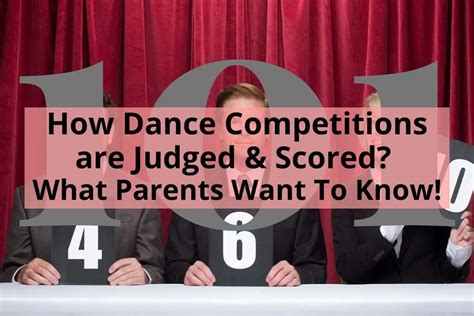How Are Dance Competitions Scored
Ronan Farrow
Mar 27, 2025 · 3 min read

Table of Contents
How Are Dance Competitions Scored? A Comprehensive Guide
Dance competitions can be thrilling events, filled with stunning performances and fierce competition. But have you ever wondered exactly how the judges arrive at those scores? The scoring system isn't always straightforward, and it can vary slightly between organizations and styles of dance. This guide will break down the common elements, providing a comprehensive understanding of dance competition scoring.
Understanding the Judging Panel
Most dance competitions utilize a panel of judges, typically three to five, each with expertise in different areas or styles of dance. This ensures a well-rounded and fair assessment of the performance. Judges are often highly experienced dancers, choreographers, or instructors themselves, bringing a wealth of knowledge and experience to the table.
What Judges Look For: Key Criteria
While the specific criteria can vary, judges generally assess performances based on a range of factors, including:
-
Technique: This is a cornerstone of dance judging. It encompasses aspects like posture, alignment, precision of movements, footwork, and the overall control and execution of steps. A dancer with strong technique will demonstrate grace, power, and accuracy in their movements. Think clean lines, sharp turns, and flawless transitions.
-
Performance Quality: This element assesses the dancer's ability to connect with the audience and convey the emotion and story behind the choreography. It considers factors like stage presence, expression, musicality, and overall engagement. Are they captivating? Do they sell the performance?
-
Choreography: The creativity, originality, and overall artistic merit of the routine are evaluated here. Judges look for a well-structured piece with dynamic transitions, interesting combinations, and a clear narrative. Is the choreography innovative? Does it tell a story?
-
Musicality: A dancer's ability to interpret the music and move in sync with its rhythm, tempo, and dynamics is crucial. The judges assess how well the movements complement the music and convey its emotions. Does the dance enhance the music, or does it overshadow it?
Scoring Systems: Different Approaches
Different dance competitions employ various scoring methods. Here are some common approaches:
Numerical Scoring:
This is perhaps the most common method. Each judge assigns a numerical score (e.g., out of 10 or 100) for each criteria, and then these scores are averaged to determine the final score. Some competitions may weight certain criteria more heavily than others.
Ranking System:
In some instances, judges might rank the dancers instead of giving numerical scores. The dancer ranked highest by the majority of judges will receive the highest score. This method can be less precise but offers a simpler approach, especially in competitions with a large number of participants.
Beyond the Numbers: The Human Element
While numerical scores provide a quantifiable measure, it's crucial to remember the subjective nature of art. The judges’ interpretation of the performance plays a significant role. Different judges may emphasize different aspects of the dance, leading to some variation in scores. Ultimately, the scoring process aims to evaluate the dancer's overall artistry and technical proficiency, leading to a fair and representative ranking.
Tips for Improving Your Score
While judges' opinions ultimately determine the outcome, dancers can improve their chances by focusing on several key areas:
- Mastering Technique: Solid technique forms the foundation of a great performance.
- Strong Stage Presence: Connect with the audience and command the stage.
- Dynamic Choreography: Create a routine that's visually engaging and memorable.
- Perfecting Musicality: Move seamlessly with the rhythm and emotion of the music.
By understanding the scoring criteria and focusing on these key areas, dancers can significantly enhance their performances and strive for higher scores in dance competitions. Remember, consistent practice, dedication, and artistic expression are key to success!
Featured Posts
Also read the following articles
| Article Title | Date |
|---|---|
| How Dinosaurs Went Extinct A Safety Guide | Mar 27, 2025 |
| How Do You Make Parched Corn | Mar 27, 2025 |
| How Long Can You Be On Workers Comp In Pa | Mar 27, 2025 |
| How Cold Can Violas Tolerate | Mar 27, 2025 |
| How Hot Does A Crematory Furnace Get | Mar 27, 2025 |
Latest Posts
Thank you for visiting our website which covers about How Are Dance Competitions Scored . We hope the information provided has been useful to you. Feel free to contact us if you have any questions or need further assistance. See you next time and don't miss to bookmark.
